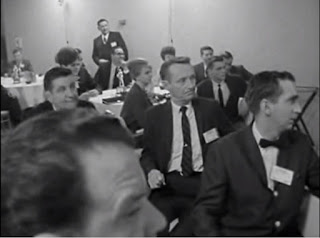cameras got big in 30s and 40s to record sound. got too bulky to move around easily.
in 50s and 60s, cameras got small so filmmakers could move around and get the shot more easily.
They were able to follow their subjects without causing huge disruptions.
main differences:
cinema verite
to obtain truth from subject, presence of film-maker must be acknowledged or discussed
participation between filmmaker and subject through interviews
requires commentary in voice over or through on-screen speaking
audience can identify with either filmmaker or subject's position and point of view
filmmaker is "fly in the soup", intervening to get response from subject
examples of verite movies:
Chronicle of a Summer (1960)
filmmakers on camera asking people in Paris "are you happy"
direct cinema "fly on the wall"
filmmaker should be as unobtrusive as possible to get truth from subject
subject is observed in natural environment
commentary is minimal or absent so subjects speak for themselves
audience should forget that filming is happening and should feel like they're in the room with the subjects
examples of direct movies:
Salesman (1969)
doco following salesmen around selling Bibles in the US with no (onscreen) input from filmmaker
Gimme Shelter (1970)
free 1969 concert by Rolling Stones to celebrate end of American tour
Hell's Angel's brought in to provide security around stage (in exchange for free beer)
concert fell into chaos and gang beat people up and killed somebody?
Ethics
doc filmers have responsibility towards human subjects
audience expects them to treat people with respect and represent htem honestly on camera
difficulties when subjects are children or know to be mentally ill
Titicut Follies (1967)
by Frederick Wiseman
observes life inside home for criminally insane
displayed practice Americans were unaware of including patients being force fed, bullied or forced to walk around naked
only allowed to be seen by health professionals up to 1991
Cinema doc revival
march of the Penguins (2005) started as French independent production, picked up by Warner Bros. and given enw score with voice-over by Morgan Freeman
put human feelings over animal experiences which scientists challenge
others in revival are Bowling for Columbine, Sicko, and Super-Size Me
Blending Real and Unreal
Reality TV shows and found footage (Blair Witch Project (1999), Cloverfield (2008))
mockumentaries This is Spinal Tap (1984)
NZ examples Forgotten Silver (1995) and What We Do in the Shadows (2014)
Blog Entry:
Explain difference between Cinema Verite and Direct Cinema
Give an example of a film that would be described as one or the other and hasn't been mentioned in class
one of my favourite mockumentaries is Drop Dead Gorgeous with Kirsten Dunst and Denise Richards.
The cameras follow the contestants of a beauty pageant and their stage moms around as they prepare for the Minnesota segment of a national beauty pageant. Hilarity, and death, ensues. The crew never says anything and is only glimpsed when they run into another crew filming the pageant for an episode of "Cops". The subjects speak for themselves directly to the cameras or in staged interviews but don't interact with the filmmakers.
Review "What We Do in the Shadows" (2014) and which style of doc the movie is
A Direct cinema mockumentary of the lives of vampires in Wellington, NZ starring Jemaine Clement and Taika Waititi.
The presence of the film crew is often noted by the subjects, who address the camera to add commentary, but they are never seen and do not comment on the action themselves. This is one of the funniest and most interesting NZ films I've seen with big actors and astonishingly good special effects (for a "small budget" NZ film). The story naturally flows from one event to another culminating in an undead ball and their human mate Stu's accidental conversion to werewolfism. According to this interview with Waititi and Clement, Stu really is their nice friend who works in IT and was completely unaware that he was a featured character in the film until it came out: "we didn't want to make him nervous." You can't get more direct than that.






No comments:
Post a Comment